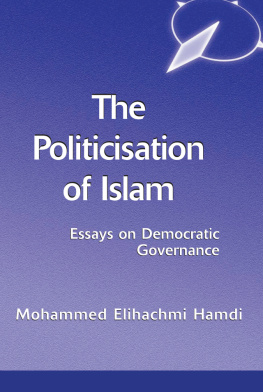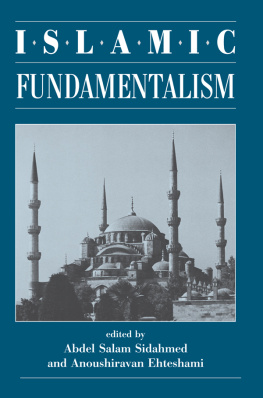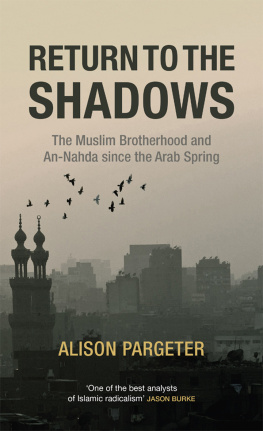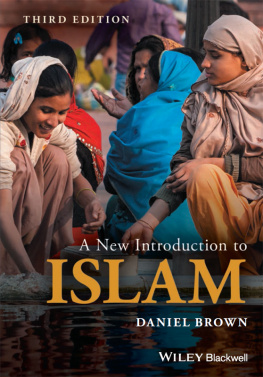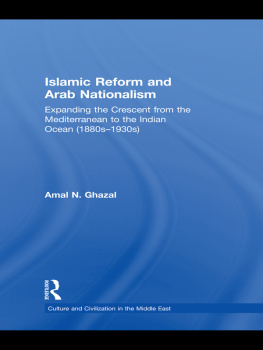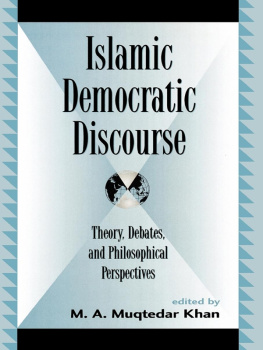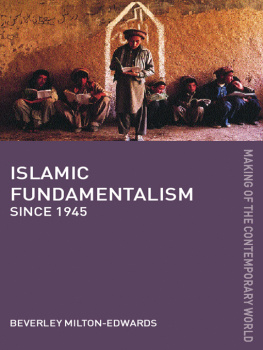The Politicisation of Islam
The Politicisation of Islam
A Case Study of Tunisia
Mohamed Elhachmi Hamdi
State, Culture, and Society in Arab North Africa
First published 1998 by Westview Press
Published 2018 by Routledge
711 Third Avenue, New York, NY 10017, USA
2 Park Square, Milton Park, Abingdon, Oxon OX14 4RN
Routledge is an imprint of the Taylor & Francis Group, an informa business
Copyright 1998 Taylor & Francis
All rights reserved. No part of this book may be reprinted or reproduced or utilised in any form or by any electronic, mechanical, or other means, now known or hereafter invented, including photocopying and recording, or in any information storage or retrieval system, without permission in writing from the publishers.
Notice:
Product or corporate names may be trademarks or registered trademarks, and are used only for identification and explanation without intent to infringe.
Library of Congress Cataloging-in-Publication Data
Hamdi, Mohamed Elhachmi
The politicisation of Islam: a case study of Tunisia / by Mohamed Elhachmi Hamdi
p. cm. (State, culture, and society in Arab North Africa)
Includes bibliographical references (p. ) and index.
ISBN 0-8133-3458-6 (hc) ISBN 0-8133-3888-3 (pb)
1. Harakat al-Nahdah (Tunisia). 2. Islam and politicsTunisia.
3. Islam and stateTunisia. 4. TunisiaPolitics and government.
5. IslamTunisiaHistory20th Century I. Title. II. Series
BP64.T7H33 1998
322.4'2'09611dc21 98-52574
CIP
ISBN 13: 978-0-8133-3888-0 (pbk)
Publisher's Note
The publisher has gone to great lengths to ensure the quality of this book but points out that some imperfections from the original may be apparent.
To the memory of my father, Yousef
First and foremost, I would like to extend my thanks to both Dr. Katharine Zebiri and Dr. Michael Brett of the School of Oriental and African Studies (University of London) who were a great source of advice and guidance when I was preparing this study during my Ph.D. programme at the School. They were both patient and generous with their time when discussing my views, reviewing my progress and helping me to consolidate my arguments in a clear and solid manner.
I am also indebted to my wife Zoubida Guemadi for the enormous assistance and support she offered me during the six years it took to prepare the material for this book and for ensuring that I completed the task, even when other concerns and engagements threatened to divert me from academic life.
I should also like to thank Mrs. Zaynab Alawiye who was helpful in giving her time and effort to review the text prior to publication, despite having other commitments to her family and business.
All translations from the Arabic and French are mine, unless otherwise indicated.
The standard system of transliteration has been used for Arabic terms, names and sources throughout the text, with minor modifications: the initial amza has been omitted, as has the final 'h' of the t' marbta.
All Arabic names of persons originating from the countries of the Maghreb have been transliterated according to the French system; therefore shn becomes 'ch' (as in the name Ghannouchi), and the qf is rendered as a 'k.' In instances where these individuals have authored sources in Arabic, their names have been transliterated in the notes according to the Arabic system of transliteration; thus Ghannouchi becomes 'al-Ghannsh'. If these same individuals have also written works in French or English, they will be referred to in these cases in accordance with the French system.
Certain Arabic words and names of personalities that are of common usage in English are not transliterated, for example 'Islam', 'Qur'an', and 'Gamal Abd al-Nasser'.
The aim of this study is to discover and analyse the history and discourse of the Tunisian Islamic movement al-Nah a in relation to post-independence Tunisian history and the trends of thought within contemporary Islamic movements. As such, the study is both historical and analytical. It attempts to give an accurate reading of the emergence, rise and eclipse of al-Nah a, as well as a comprehensive analysis of its political, social and intellectual discourse.
The importance of the study comes from the fact that it may be considered the first academic research done in English on al-Naha ; up to now, the movement has received only scant treatment in English sources. The most elaborate work to date on this subject is Franois Burgat and William Dowell's The Islamic Movement in North Africa. where he reviewed the history of the Islamic movement not only in Tunisia but also in Algeria, Libya and Morocco. None the less, his research into al-Nah a may be considered the most thorough thus far among French sources.
Even in Arabic, books published about the Tunisian Islamic movement are very rare. Of the few published, one is entitled al-Nah a ,
Although the Algerian Islamic Salvation Front (FIS) has attracted more attention in the Maghreb as a whole since 1990, it was the Tunisian Islamic movement that played the role of the champion of Islamism in the region during the eighties, gaining more fame and attracting more scrutiny than any other Islamic organisation in the Maghreb. However, this scrutiny has come mostly from the media rather than from academics.
In this sense, carrying out academic research in English into al-Naha may claim some originality from this fact alone, in that it may achieve the following: to encourage other researchers to give closer attention to an important part of the Maghreb, and to a movement that has given the impression of adapting to modernity and the changing times, succeeding in the late eighties in commanding strong sympathy among many democrats and liberals in the Arab world, and even in the West, which is supposedly seen as an ideological opponent of Islamism in general.
But there are also other factors that give this study its significance. Most important is that it aims to expose and analyse the efforts of the Tunisian Islamists in answering some of the major questions facing those who are engaged in contemporary Islamic thought, and specifically the role of Islam in modern public life. Probably the first question leading to this wider debate is how a political movement gains its Islamic identity or nature: is it simply because it calls itself Islamic? Is it because of its programmes or intentions, or because of the religious affiliations of its leaders and members?
As the conflict intensifies between Islamic movements and their governments, Tunisia itself being one of the most striking cases, questions are raised with regard to this claim to Islamicity, especially by opponents of Islamic movements, who accuse them of manipulating religion for political ends, and who call for Islam to be above partisan politics. However, this question is not only about politics, but also about essential matters of faith and understanding of Islam. This is particularly true when studying the view of Islamic movements, in this case al-Naha, their societies and their religious mission. Being an "Islamic' movement poses a very important question: is the society itself Islamic? If it is not, should Islamists obey its rules? The answer to these questions may prove vital in reassessing the political role of religion in the Arab world, and the political and cultural divisions that arise from it.

